
Finish Line Realty transforms the real estate experience in Louisville, Kentucky. We provide a comprehensive suite of services, including residential and commercial property sales, property management, and investment consulting. Our team of experienced professionals guides clients through every step of the buying, selling, and leasing processes, ensuring a seamless and enjoyable experience.
With a deep understanding of the local market and a commitment to helping clients achieve their real estate goals, Finish line realty turns your real estate dreams into reality.
Evaluate Your Keywords
When it comes to ranking for specific keywords, it’s essential to look at two factors: keyword difficulty and search volume. Keywords with low difficulty but decent search volume are your sweet spot. These are the terms that will help you rank faster and drive qualified traffic.
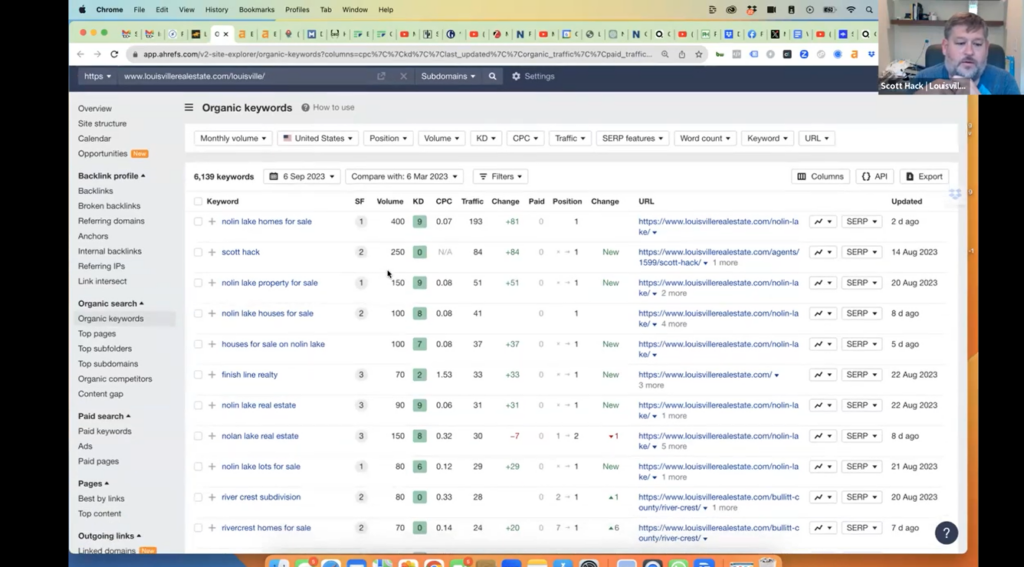
For example, if you’re ranking number one for long-tail keywords like “Louisville homes near the river,” you’re on the right track. These targeted phrases attract users who are more likely to convert into clients. Make sure you focus on both local keywords and general real estate terms to capture a wider audience.
If your location is properly listed, you’re more likely to rank for local searches. But here’s the catch: if you’re located a bit farther out from the city center, you might find it challenging to compete with businesses that are right in the thick of it.
One strategy that many businesses in competitive fields employ is setting up shop in a prime location. For example, if a real estate agency establishes its office downtown, it can significantly boost its chances of ranking for a broader range of keywords. This is because search engines tend to favor businesses that appear to be more centrally located.
However, just having a great location isn’t enough. You also need to be proactive about building links to your GMB listing. This means creating relationships with other local businesses, engaging with your community, and ensuring that your online presence reflects your physical one.
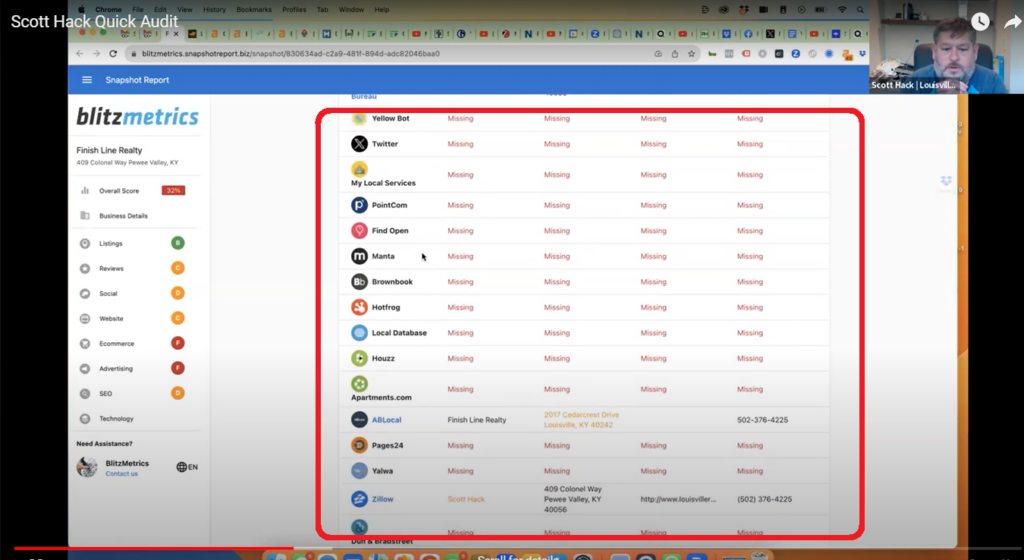
Consistency is key! Your NAP information must be accurate across all platforms to avoid confusion for both search engines and potential customers. This consistency builds trust and makes it easier for your audience to find you.
Maximizing Your Google My Business (GMB) Profile
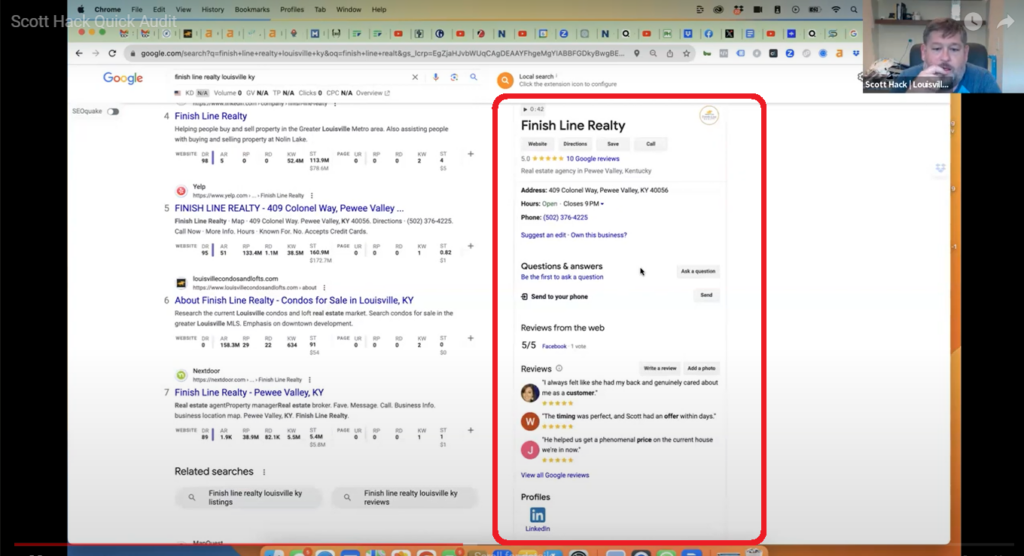
Google My Business (GMB) profile is one of the most powerful tools you have. It’s about visibility in your community. For instance, if you’re running a real estate business in Louisville, it’s crucial to ensure that your Google My Business listing is set up correctly. This includes having your name, address, and phone number (NAP) the same across all platforms.
Fill out every section: Include your services, Q&A, business hours, and a detailed description.
Respond to reviews: Engage with your customers by responding to every review, positive or negative.
Upload photos regularly: Google favors businesses that keep their profiles active with fresh, relevant images.
Claim your team member’s profiles: If you work with a team, ensure their profiles are also linked to your business.
Don’t forget that local signals like charity donations or community involvement can earn you high-quality backlinks. Even small actions, such as sponsoring a local event, can help boost your credibility.
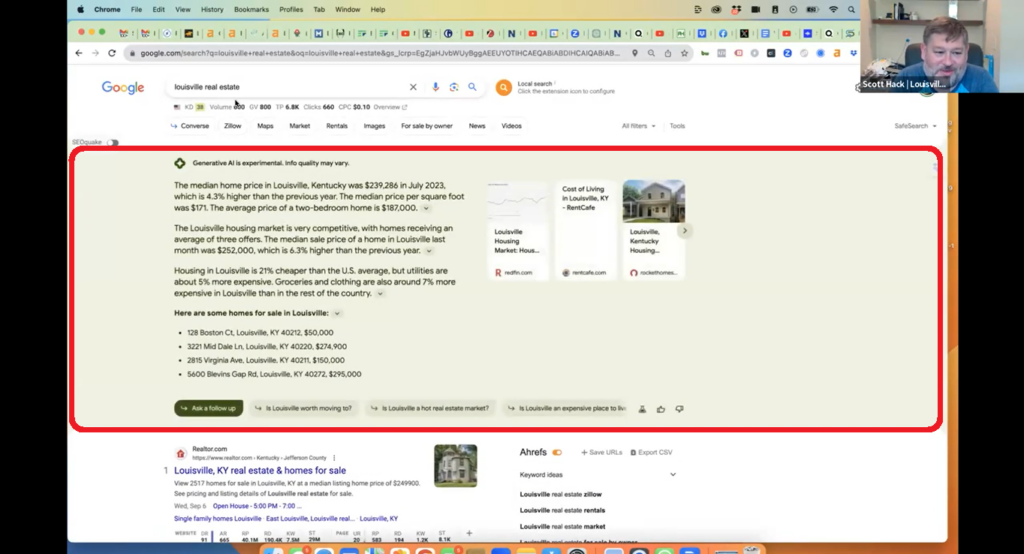
The SEO landscape is changing rapidly with advancements in AI. Google’s algorithms are leaning more toward helpful content that adds value to users. This means that AI-generated content, rich snippets, and dynamic search features are becoming part of the SEO equation.
Incorporating media-rich content like infographics, videos, and maps can improve your engagement and keep users on your site longer, which sends positive signals to Google.
Many agents aim for broad keywords like “real estate in Louisville” or “Kentucky homes for sale,” but these are highly competitive. To differentiate yourself, focus on long-tail keywords. These are more specific search phrases like “two-bedroom homes near Louisville riverfront” or “homes with finished basements in Kentucky.”
Long-tail keywords typically have lower search volumes but higher conversion rates because they attract users with very specific needs. It’s easier to rank for these terms, and the traffic you’ll get is much more targeted. For real estate, this can mean leads that are closer to making a buying or selling decision.
Use tools like Google’s Keyword Planner or SEMrush to discover long-tail keyword opportunities related to your local market. Integrate these into your content and optimize your pages accordingly.
Audit Your Competitor’s Strategies
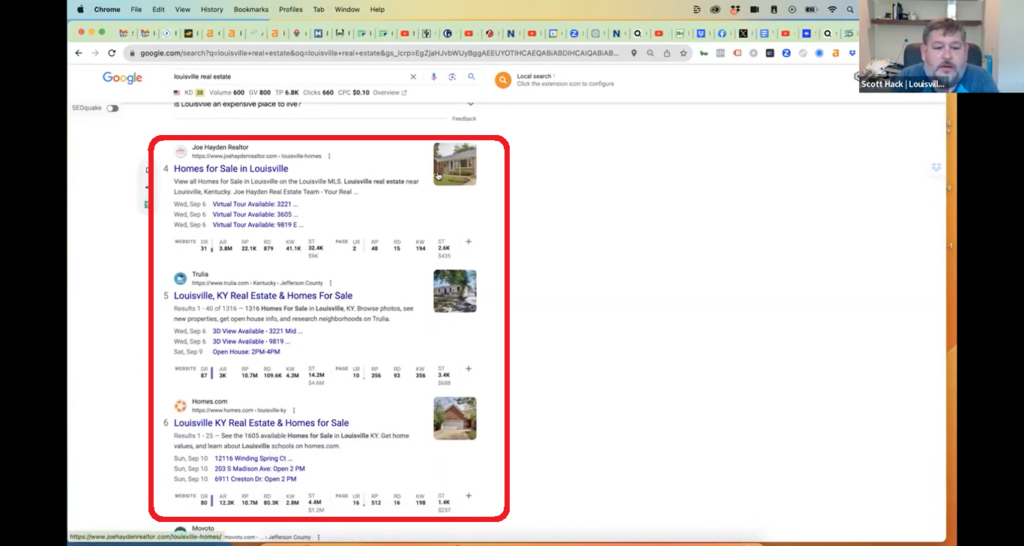
One of the best ways to improve your SEO is by auditing your competitors. This doesn’t mean copying their strategies but rather understanding what they’re doing well and finding gaps you can exploit. Start by examining their backlink profiles, content, and keyword rankings.
Are they ranking higher than you for certain terms? Take a look at the quality and authority of their backlinks. Are there directories, local blogs, or news outlets that they’ve gotten links from, but you haven’t? Securing similar backlinks could give you a boost.
Competitor Analysis Tools: Use SEO tools like Ahrefs or Moz to dive deep into their backlink profiles. Analyze what content is driving traffic to their site and whether you can create something even better.
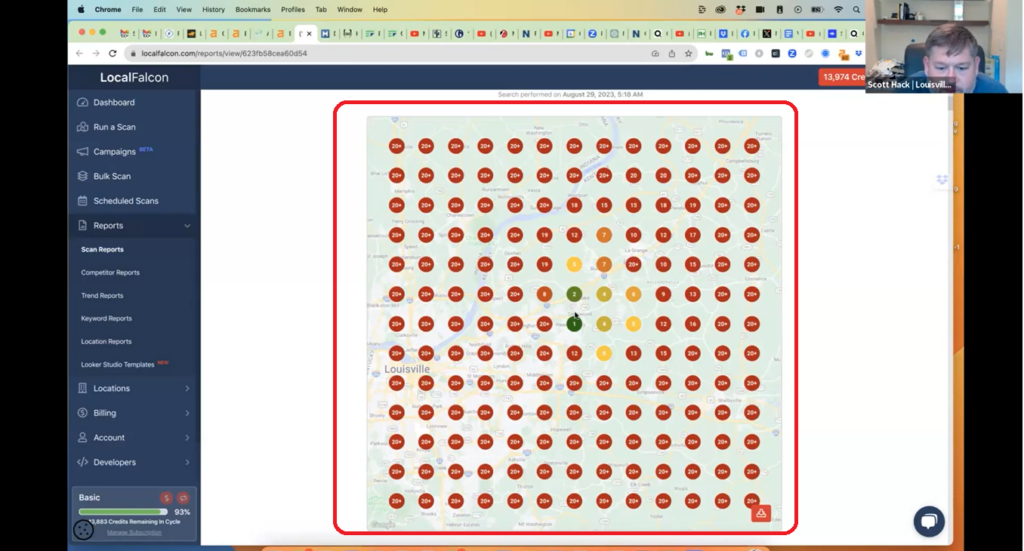
Local SEO isn’t just about using keywords that match your geographic area. To truly stand out, you need to become an authority in your community. The easiest way to do this is by creating hyper-local content that addresses the unique needs of your market.
For example, write blog posts that highlight:
- The best neighborhoods for families in your area
- Upcoming real estate developments in Louisville
- Local market trends and how they affect buyers or sellers
- A guide to living in Kentucky for new residents
When Google sees that you’re providing relevant, in-depth content tailored to your specific area, it will favor your site in local search results. Plus, it builds trust with potential clients, showing that you’re knowledgeable about the area.
Include local landmarks, events, and community involvement in your content. Google uses these references to associate your website with specific locations, boosting your geo-relevance.
Regularly share blog posts, market updates, and client success stories on your social media platforms to drive engagement. Don’t forget to include calls to action encouraging users to visit your site or contact you directly.
Real Estate SEO Strategy With Dennis Yu
- Fix the little things: typos and consistency matter
- Enhance your agent profiles
- Leverage video content for maximum visibility
- Capture real moments, not just stock images
- Link internally to boost SEO power
- Keep content fresh and updated
- Build relationships and show community involvement
- Use Google’s tools to organize your content
- Personalize your listings with local knowledge
- Keep it simple: focus on relationships, not just SEO
SEO is essential for growing your online presence and getting more leads. But with so many moving parts, from content creation to backlink building, it’s easy to overlook some crucial steps.
Many times, small details get overlooked, like typos or inconsistent terminology. These things may seem minor, but they can negatively impact user experience and your rankings. For instance, make sure there aren’t spelling errors on your site, like confusing “finish” with “Finnish.” Having clear, professional content builds trust and helps users stay engaged longer.
Action Step: Review your website and fix any typos, awkward phrasing, or inconsistencies. Use tools like Grammarly to catch errors that might slip through.
Each agent on your team is a valuable resource, and their online profiles should reflect that. Many agents simply have a basic bio with minimal information, but that’s a missed opportunity. Add more detailed information, including videos of your agents talking about their expertise, neighborhood knowledge, or even a day in their lives.
Action Step: Google loves videos, and embedding video content on your site can improve rankings. Agents with personalized video profiles will stand out, build trust with potential clients, and improve engagement.
Videos are becoming one of the most powerful tools in SEO. If you’re not already using them, you’re missing out. By embedding videos in your blog posts or agent profiles, you’re not only engaging users but also improving your chances of ranking higher in search results. Whether it’s property tours, neighborhood reviews, or tips for buyers and sellers, video content adds a dynamic element to your site.
Action Step: Start small. Create short, simple videos using your smartphone, and post them across multiple channels. Take snippets from your videos to use in blog posts and social media, leveraging each piece of content to the fullest.
Stock photos might look polished, but they don’t send the right local signals to Google. Instead, capture real moments from your life, your agents, and your clients. If you’re attending local events, meeting with clients, or working in a specific neighborhood, document it. Real images from the area you serve help show that you’re truly involved in the community, and Google picks up on these local cues.
Action Step: Take candid photos with clients, at community events, or when you’re out-showing homes. It doesn’t need to be overly polished authenticity is key.
One of the quickest ways to boost your blog’s SEO is to link between posts. You might have great content, but if the posts aren’t linked to each other, you’re missing out on an opportunity for increased traffic and better rankings. Internal links help Google understand the structure of your site, and they encourage users to spend more time exploring related topics.
Action Step: Review your blog posts and add internal links where relevant. This simple update can increase your site’s authority and keep readers engaged.
Old content can still be valuable, but it needs updating. If you have articles or blog posts that are more than a couple of years old, take the time to refresh them. Add new insights, update statistics, and incorporate new photos or videos. Google rewards updated content, and it’s a great way to re-engage your audience without starting from scratch.
Action Step: Go back to posts from a few years ago, like those about neighborhood guides or home-buying tips. Refresh them with current information, and give them a new lease on life.
SEO today is as much about building relationships as it is about keywords and backlinks. Real estate agents who know their neighborhoods inside and out and are actively involved in the community are the ones who generate referrals and stay top-of-mind. Sponsor local events, take part in community activities, and share these experiences on your website and social media.
Action Step: Attend local events, take pictures, and blog about them. Highlight your involvement with the community, and make sure to connect those efforts back to your SEO strategy by incorporating keywords and local phrases.
Google Photos is a great tool to organize all the images and videos you’re capturing. It automatically categorizes everything, making it easy to find specific content when you need it. Whether it’s a video of you working with a client or a snapshot of a local neighborhood, having everything organized allows you to quickly enrich your blog posts and pages.
Action Step: Use Google Photos to tag your content with specific locations and keywords relevant to your market. This adds another layer of local relevance to your content, helping you rank better in searches for your area.
When you’re writing blogs or creating listings, avoid generic stock content. Instead, use your local knowledge to make the content more personalized. Mention local businesses, landmarks, and even local celebrities. Google favors content that’s relevant to specific geographic locations, and including these details can help your pages rank higher for local searches.
Action Step: When writing about a neighborhood, mention nearby schools, parks, or restaurants that clients might be interested in. Incorporate personal anecdotes or stories to make the content more engaging and trustworthy.
At the end of the day, SEO is about more than just algorithms and search rankings. It’s about building relationships whether it’s with potential clients, local businesses, or other agents. When you’re out in the community, meeting people, and building your network, you’re naturally creating content that can enhance your SEO. Authentic relationships generate positive signals that help your site perform better over time.
Action Step: Take every opportunity to meet new people and document those interactions. Whether it’s a quick photo with a local business owner or a video from a community event, this content adds a personal touch to your website and boosts your local authority.
Focus on building genuine relationships in your community, and your SEO results will naturally follow.
